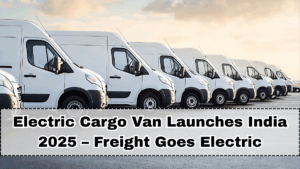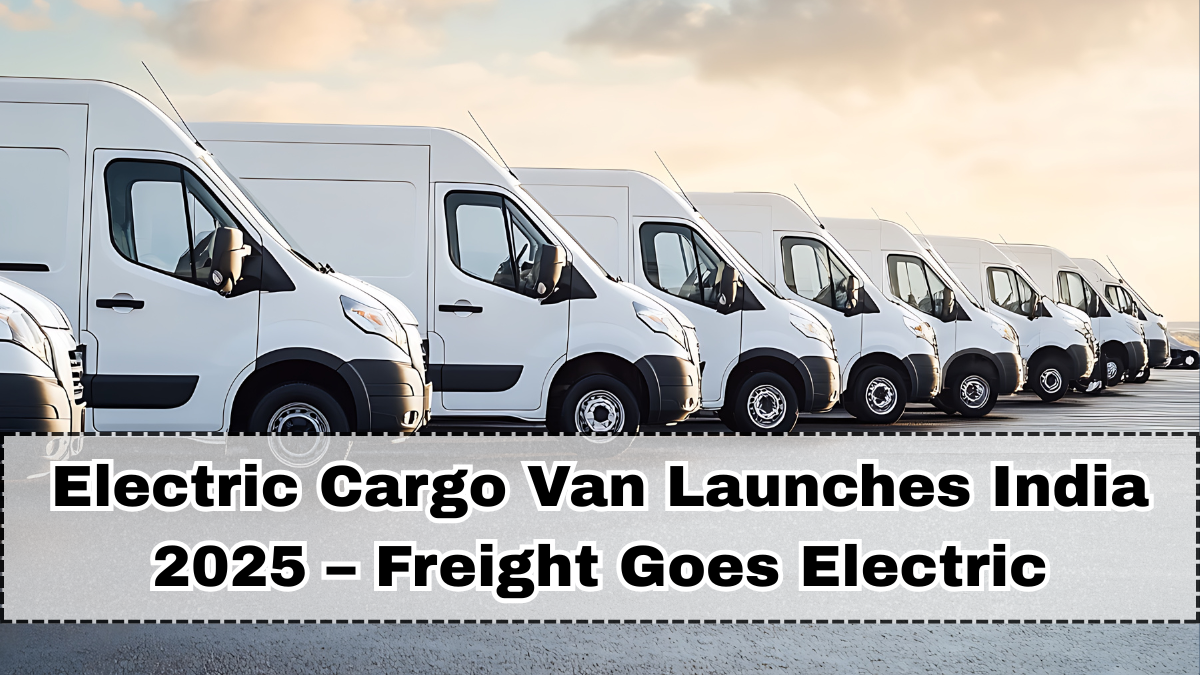India’s logistics sector is gearing up for a major transformation as Upcoming Electric Cargo Van Launches India 2025 introduce clean, efficient, and cost-friendly electric vans across small, medium, and large cargo categories. With rising fuel prices, e-commerce growth, and the need for sustainable logistics, electric cargo vans are becoming essential for last-mile delivery, intercity transportation, and corporate fleet operations. In 2025, automakers and EV startups will launch a diverse range of cargo EVs featuring longer range, high payload capacity, and fast-charging capability, making electric vans a practical alternative to diesel-powered vehicles.
Electric vans are not only cheaper to operate but also quieter, easier to maintain, and ideal for urban logistics. The growth of the e-van India 2025 segment is driven by government incentives, low running costs, and the push for zero-emission mobility. Companies operating in delivery, warehousing, pharmaceuticals, food distribution, and retail logistics are increasingly adopting electric vans to reduce costs and meet sustainability targets. With India’s e-commerce market booming, the timing for large-scale electric van deployment couldn’t be better.

Major Electric Cargo Van Launches in India in 2025
1. Tata Ace EV Max Cargo – India’s Most Anticipated E-Van
Tata Motors will expand its EV lineup by launching the Ace EV Max Cargo, designed for urban and mid-range logistics.
Key Highlights:
• Range: 180–220 km
• Payload: 600–750 kg
• Charging: Fast + standard charging
USP: Strong reliability and widest service network
2. Mahindra e-Supro Cargo 2025 – Updated for Higher Efficiency
Mahindra’s 2025 update to the e-Supro Cargo brings better range and improved electric drivetrain performance.
Key Highlights:
• Range: 150–200 km
• Features: Digital cluster, fleet telematics
• Safety: Regenerative braking
USP: Ideal for short-distance commercial routes
3. BYD E-Cargo Van – Premium Electric Logistics
BYD is expected to launch an advanced cargo van for commercial operations with high-capacity batteries and premium build quality.
Key Highlights:
• Range: 250+ km
• Battery: Blade Battery technology
• Tech: AI-based fleet optimization
USP: Best long-range e-cargo van option
4. Omega Seiki Stream Cargo EV – Lightweight Urban Carrier
Omega Seiki Mobility will introduce a lightweight cargo van perfect for city deliveries and small-load distribution.
Key Highlights:
• Range: 120–160 km
• Payload: Ideal for small businesses
• Charging: Quick charging options
USP: Most economical urban-friendly cargo EV
5. Ashok Leyland E-LCV Cargo – Bigger Space, Stronger Motor
Ashok Leyland’s electric LCV will target mid-size commercial buyers with larger loading space and a robust e-motor.
Key Highlights:
• Range: 150–210 km
• Payload: 1-ton class
• Features: Smart cabin + improved cooling
USP: Great for longer daily logistics cycles
Why Electric Cargo Vans Matter for India’s Logistics Future
Electric vans improve operational efficiency while lowering environmental impact. They are highly suitable for last-mile and intra-city logistics where frequent stops and slow traffic impact fuel efficiency.
Benefits include:
• Up to 70% lower running cost
• Zero tailpipe emissions
• Quiet and smooth operation
• Lower maintenance (fewer moving parts)
• Ideal for dense metro areas
The electric cargo vehicle India movement supports India’s sustainability goals and offers businesses immediate cost-saving advantages.
Range, Battery & Efficiency Improvements
2025 electric cargo vans feature upgraded battery packs, stronger motors, and smarter energy management systems designed for high daily usage.
Expected improvements:
• Range improvements of 20–30%
• Better battery cooling for long hours
• Reduced charging time due to fast chargers
• Regenerative braking for maximum efficiency
These improvements make electric vans suitable for longer delivery routes and continuous fleet operations.
Technology & Smart Fleet Features
Electric cargo vans are becoming smarter with integrated telematics, connected dashboards, and real-time fleet management software.
Key tech features include:
• GPS tracking + geofencing
• Battery health monitoring
• Route optimization through AI
• Remote diagnostics
• Digital driver reports
Fleet operators can track vehicle performance, reduce downtime, and improve delivery efficiency through cloud-based management tools.
Cost & Operational Benefits for Businesses
Electric vans significantly reduce operational expenses, making them ideal for both small operators and large logistics companies.
Cost benefits:
• Low electricity cost vs diesel
• Fewer service requirements
• Longer motor life
• Potential subsidies and tax benefits
Operational benefits include better uptime and reduced breakdowns, thanks to simpler electric drivetrains.
Why 2025 Will Be a Turning Point
The introduction of multiple electric van models, improved charging networks, and rising EV adoption will make 2025 the breakthrough year for commercial e-vans. Businesses will shift towards EV fleets to reduce costs, improve efficiency, and meet sustainability requirements.
As e-commerce continues expanding, electric cargo vans will play a central role in shaping India’s logistics backbone.
FAQs
How long do electric cargo vans take to charge?
Fast charging can take 60–90 minutes, while standard charging may take 4–6 hours.
Are electric cargo vans reliable for daily use?
Yes, their efficient motors and fewer moving parts ensure long-term reliability.
Can electric vans handle heavy loads?
Yes, several 2025 models can carry 600 kg to 1 ton depending on category.
Are subsidies available for cargo EVs?
Government incentives and state-level benefits may apply.
Is maintenance expensive?
No, EV vans typically have much lower maintenance costs than diesel vans.
Click here to know more.
